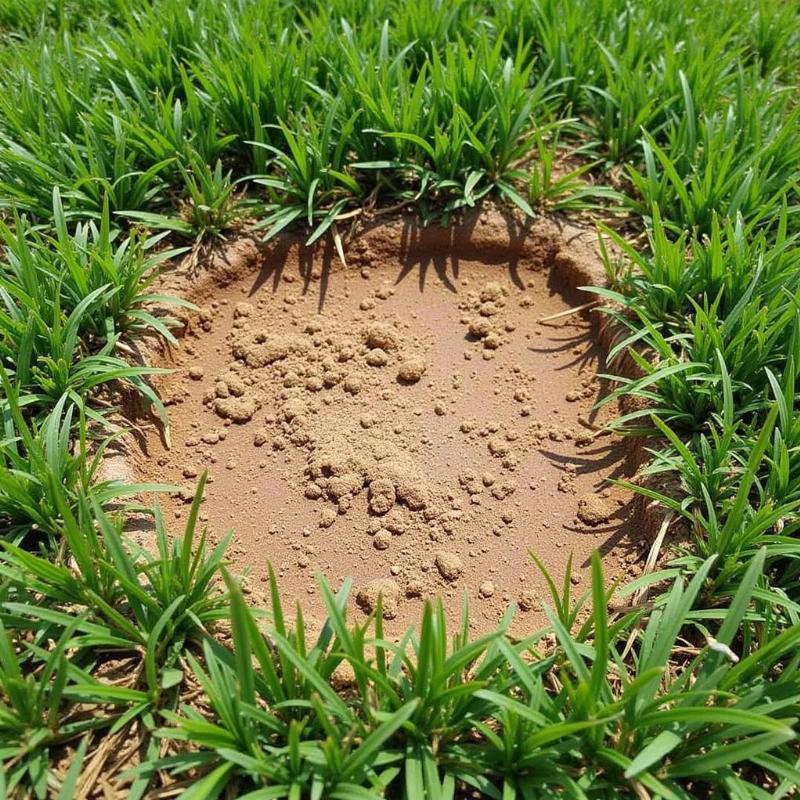Dog urine spots on your lawn are a common problem for pet owners across America. You’re likely searching for a solution, and you may have heard about using lime. So, does lime help with dog urine spots? The short answer is: not really. While lime is often touted as a remedy, the science doesn’t back it up. Let’s delve deeper into the causes of these unsightly patches and explore effective solutions for a healthy, vibrant lawn.
Understanding the Science Behind Dog Urine Spots
Those brown patches aren’t caused by the acidity of dog urine, as commonly believed. In fact, dog urine is usually slightly acidic to neutral on the pH scale. The real culprit is the high concentration of nitrogen in the urine. This nitrogen overload acts like a fertilizer overdose, initially causing rapid green growth, followed by browning and dieback as the grass is essentially “burnt.” This concentrated nitrogen also affects the soil’s pH balance, but not significantly enough for lime to make a noticeable difference.
 Dog Urine Lawn Damage
Dog Urine Lawn Damage
Debunking the Lime Myth
Lime is often recommended to neutralize dog urine, but this advice is based on a misunderstanding of the underlying issue. While lime can raise the pH of acidic soil, the primary problem with dog urine spots isn’t acidity, but nitrogen concentration. Adding lime won’t counteract the nitrogen overload and can even exacerbate the issue by disrupting the soil’s natural balance if applied incorrectly. Furthermore, excessive lime application can actually inhibit nutrient absorption by the grass, leading to further problems.
Effective Solutions for Dog Urine Spots
So, if lime isn’t the answer, what is? Here are proven methods for dealing with those pesky brown spots:
- Dilution is key: Encourage your dog to drink more water. This dilutes the nitrogen in their urine, reducing its impact on the lawn. Consider adding water to their wet food or providing more accessible water sources in your yard.
- Designated potty area: Train your dog to urinate in a specific area of your yard, preferably one that isn’t highly visible or important to the overall aesthetic. You could use a designated patch of gravel or mulch.
- Immediate watering: Flush the area with water immediately after your dog urinates. This helps dilute the nitrogen and spread it over a larger area, minimizing damage.
- Specialized lawn care products: Several products on the market are designed to repair dog urine spots. Look for products containing beneficial bacteria that break down nitrogen and encourage grass growth.
- Choosing resistant grass varieties: Some grass types, like fescue and ryegrass, are more tolerant to dog urine than others. Consider these varieties if you’re reseeding or planting a new lawn.
Expert Insights
“Watering the affected area immediately after your dog urinates is the single most effective way to minimize damage,” says Dr. Emily Carter, DVM, a leading veterinarian in New York City. “It’s a simple yet powerful solution that every pet owner can implement.”
Landscape architect John Miller adds, “Choosing the right grass variety can significantly reduce the impact of dog urine. Fescue and ryegrass are excellent options for pet owners.”
Conclusion
While lime might seem like a logical solution for dog urine spots, it’s not the most effective approach. Understanding the science behind these brown patches is crucial for implementing the right solutions. By focusing on dilution, targeted watering, and potentially using specialized products or resistant grass varieties, you can achieve a healthy, vibrant lawn that can withstand the demands of your furry friend. Remember, a little knowledge and proactive care can make a big difference in maintaining a beautiful lawn.
FAQ
- Is dog urine always acidic? No, dog urine can vary in pH, often ranging from slightly acidic to neutral.
- Will baking soda neutralize dog urine? Similar to lime, baking soda doesn’t address the core issue of nitrogen concentration.
- How often should I water dog urine spots? Water the area immediately after your dog urinates for best results.
- Can dog urine damage artificial turf? While artificial turf is more resistant, it can still be affected by dog urine, particularly if not cleaned regularly.
- What are the best grass types for dog owners? Fescue and ryegrass are generally considered more resistant to urine damage.
Beautdogs.us: Your Trusted Source for Dog Care
Beautdogs.us is America’s leading dog lifestyle website, offering comprehensive and engaging content on all aspects of dog care and companionship. We combine veterinary expertise, breed-specific knowledge, and top-notch content creation to empower dog owners with the information they need. Whether you’re a seasoned dog owner or just starting your journey, Beautdogs.us is your trusted source for everything dog-related, from breed information to grooming tips and product recommendations. Contact us today to learn more! Email: [email protected], Phone: +1 501-555-7529.